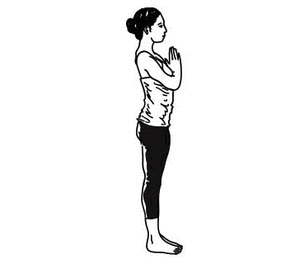The word yoga is derived from the संस्कृत root yuj meaning to bind, join, attach and yoke, to direct and concentrate one's attention on, to use and apply.
One who follows the path of Yoga is a yogi or yogini.
When his mind, intellect and self are under control, freed from restless desire, so that they rest in the spirit within, a man becomes a Yukta-one in communication with God.
Yoga has also been described as wisdom in work or skilful living amongst activities, harmony and moderation.
'Yoga' is not for him who gorges too much, nor for him who starves himself. It is not for him who sleep to much, not for him who stays awake. By moderation in eating and in resting, by regulation in working and by concordance in sleeping and working, Yoga destroyed all pain and sorrow.
The stages of yoga
There are eight stages of yoga. They are :
1.Yama (universal moral commandments)
2.Niyama(self purification by discipline)
3.Asana(posture)
4.Pranayama(rhythmic control of the breath)
5.Pratyahara(withdrawal of the mind from the domination of the senses and exterior objects)
6.Dharana(concentration)
7.Dyana(meditation)
8.Samadhi(a state of super-consciousness brought about by profound meditation, in which the individual aspirant becomes one with the object of his meditation - pranayama or the Universal spirit).
One who follows the path of Yoga is a yogi or yogini.
When his mind, intellect and self are under control, freed from restless desire, so that they rest in the spirit within, a man becomes a Yukta-one in communication with God.
Yoga has also been described as wisdom in work or skilful living amongst activities, harmony and moderation.
'Yoga' is not for him who gorges too much, nor for him who starves himself. It is not for him who sleep to much, not for him who stays awake. By moderation in eating and in resting, by regulation in working and by concordance in sleeping and working, Yoga destroyed all pain and sorrow.
The stages of yoga
There are eight stages of yoga. They are :
1.Yama (universal moral commandments)
2.Niyama(self purification by discipline)
3.Asana(posture)
4.Pranayama(rhythmic control of the breath)
5.Pratyahara(withdrawal of the mind from the domination of the senses and exterior objects)
6.Dharana(concentration)
7.Dyana(meditation)
8.Samadhi(a state of super-consciousness brought about by profound meditation, in which the individual aspirant becomes one with the object of his meditation - pranayama or the Universal spirit).





No comments:
Post a Comment